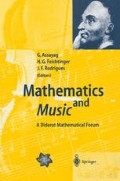Abstract
The logic of musical composition, representation, analysis, and performance share important basic structures which can be described by Grothendieck’s functorial algebraic geometry and Lawvere’s topos theory of logic. We give an account of these theoretical connections, discuss and illustrate their formalization and implementation on music software. Three issues are particularly interesting in this context: First, the crucial insight of Grothendieck that “a point is a morphism” carries over to music: Basically, musical entities are transformations rather than constants. Second, it turns out that musical concepts share a strongly circular character, meaning that spaces for music objects are often defined in a self-referential way. Third, the topos-theoretic geometrization of musical logic implies a progressively geometric flavour of all rational interactions with music, in particular when implemented on graphical interfaces of computer environments.
Das ist wohl schon die Mathematik des “Neuen Zeitalters”.
Alexander Grothendieck [12] on “Geometrie der Töne” [20]
Access this chapter
Tax calculation will be finalised at checkout
Purchases are for personal use only
Preview
Unable to display preview. Download preview PDF.
References
Aczel, P.: Non-well-founded Sets. No. 14 in CSLI Lecture Notes. Stanford: Center for the Study of Language and Information 1988
Agawu, V.K.: Playing with Signs. Princeton: Princeton University Press 1991
Barwise, J., Etchemendy, J.: The Liar: An Essay on Truth and Circularity. New York: Oxford University Press 1987
Beran, J.: Cirri. Centaur Records 1991
Beran, J., Mazzola, G.: Immaculate Concept. Zürich: STOA music 1992
Beran, J.: Śānti. Bad Wiessee: collegno 2000
de Bruijn, N.G.: Pólya’s Theory of Counting. In: Beckenbach, E.F. (ed.): Applied Combinatorial Mathematics, Chapt. 5. New York: Wiley 1964
Finsler, P.: Über die Grundlegung der Mengenlehre. Erster Teil. Die Mengen und ihre Axiome. Math. Z. 25, 683–713 (1926)
Finsler, P.: n Aufsätze zur Mengenlehre. Unger, G. (ed.). Darmstadt: Wiss. Buchgesellschaft 1975
Fripertinger, H.: Endliche Gruppenaktionen in Funktionenmengen — Das Lemma von Bumside — Repräsentantenkonstruktionen — Anwendungen in der Musiktheorie. Doctoral Thesis, Univ. Graz 1993
Fux, J.J.: Gradus ad Parnassum (1725). Dt. und kommentiert von L. Mitzier. Leipzig 1742
Grothendieck, A.: Correspondence with G. Mazzola. April, 1990
Grothendieck, A., Dieudonné, J.: Eléments de Géométrie Algébrique I-IV. Publ. Math IHES no. 4, 8, 11, 17, 20, 24, 28, 32. Buressur-Yette 1960–1967
Jackendoff, R., Lerdahl, F.: A Generative Theory of Tonal Music. Cambridge, MA: MIT Press 1983
Jakobson, R.: Linguistics and Poetics. In: Seboek, T.A. (ed.): Style in Language. New York: Wiley 1960
Jakobson, R.: Language in relation to other communication systems. In: Lin-guaggi nella società e nella técnica. Edizioni di Communità. Milano 1960
Mac Lane, S., Moerdijk, I.: Sheaves in Geometry and Logic. Berlin, Heidelberg, New York: Springer-Verlag 1994
Mazzola, G.: Die gruppentheoretische Methode in der Musik. Lecture Notes, Notices by H. Gross, SS 1981. Zürich: Mathematisches Institut der Universität 1981
Mazzola, G.: Gruppen und Kategorien in der Musik. Berlin: Heldermann 1985
Mazzola, G.: Geometrie der Töne. Basel: Birkhäuser 1990
Mazzola, G.: Geometrie der Töne. Basel: Birkhäuser 1990
Mazzola, G.: Synthesis. Zürich: STOA music 1990
Mazzola, G.: Mathematische Musiktheorie: Status quo 1990. Üer. d. Dt. Math.-Verein. 93, 6–29 (1991)
Mazzola, G., Zahorka, O.: The RUB ATO Performance Workstation on NeXTSTEP. In: ICMA (ed.): Proceedings of the ICMC 94, S. Francisco 1994
Mazzola, G., Zahorka, O.: Geometry and Logic of Musical Performance I, II, III. SNSF Research Reports (469pp.), Zürich: Universität Zürich 1993–1995
Mazzola, G. et al.: Neuronal Response in Limbic and Neocortical Structures During Perception of Consonances and Dissonances. In: Steinberg, R. (ed.): Music and the Mind Machine. Berlin, Heidelberg, New York: Springer-Verlag 1995
Mazzola, G., Zahorka, O.: RUBATO on the Internet. Univ. Zürich 1996. http://www.rubato.org
Mazzola, G.: Semiotic Aspects of Musicology: Semiotics of Music. In: Posner, R. et al. (eds.): A Handbook on the Sign-Theoretic Foundations of Nature and Culture. Berlin, New York: Walter de Gruyter 1998. Preview on http://www.ifi.unizh.ch/mml/musicmedia/publications.php4
Mazzola, G.: Music Encyclo Space. In: Enders, B. (ed.): Proceedings of the klangart congress’98. Universität Osnabrück 1998 Preview on http://www.ifi.unizh.ch/mml/musicmedia/publications.php4
Mazzola, G. et al.: The Topos of Music — Geometric Logic of Concepts, Theory, and Performance. To appear, Basel: Birkhäuser 2002
Nattiez, J.-J.: Fondements d’une Sémiologie de la Musique. Paris: Edition 10/18 1975
Noll, T.: Morphologische Grundlagen der abendländischen Harmonik. Doctoral Thesis, TU Berlin 1995
Noll, T.: The Consonance/Dissonance-Dichotomy Considered from a Morphological Point of View. In: Zannos, I. (ed.): Music and Signs — Semiotic and Cognitive Studies in Music. Bratislava: ASCO Art &; Science 1999
Riemann, H.: Musikalische Logik. Leipzig 1873
Riemann, H.: Vereinfachte Harmonielehre oder die Lehre von den tonalen Funktionen der Akkorde. London 1893
Riemann, H.: Handbuch der Harmonielehre. Leipzig 6/1912
Ruwet, N.: Langage, Musique, Poésie. Paris: Seuil 1972
Vinet, H., Delalande, F. (eds.): Interface homme-machine et création musicale. Paris: Hermès 1999
Wittgenstein, L.: Tractatus Logico-Philosophicus (1918). Prankfurt/Main: Suhrkamp 1969
Zahorka, O.: PrediBase — Controlling Semantics of Symbolic Structures in Music. In: ICMA (ed.): Proceedings of the ICMC 95. S. Francisco 1995
Editor information
Editors and Affiliations
Rights and permissions
Copyright information
© 2002 Springer-Verlag Berlin Heidelberg
About this chapter
Cite this chapter
Mazzola, G. (2002). The Topos Geometry of Musical Logic. In: Assayag, G., Feichtinger, H.G., Rodrigues, J.F. (eds) Mathematics and Music . Springer, Berlin, Heidelberg. https://doi.org/10.1007/978-3-662-04927-3_12
Download citation
DOI: https://doi.org/10.1007/978-3-662-04927-3_12
Publisher Name: Springer, Berlin, Heidelberg
Print ISBN: 978-3-642-07836-1
Online ISBN: 978-3-662-04927-3
eBook Packages: Springer Book Archive

